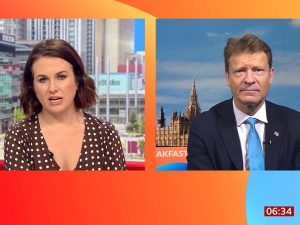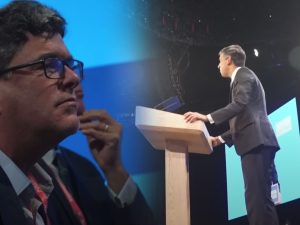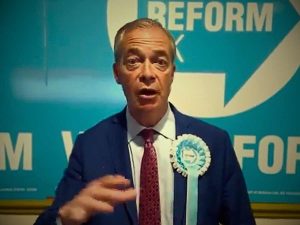Nigel Farage has maintained his relevance in this general election despite setbacks such as continuously failing to become an MP. How has he achieved this? His open door invitation at the BBC certainly hasn’t hurt:
Funny how the BBC will have Farage on over & over but when Mick Lynch destroyed Tories he was never invited on again. Yeah and they say BBC’s left wing… ok then. #BBCqt
— Claire #EnoughIsEnough 💙 (@clairebubblepop) June 15, 2024
Despite the BBC‘s obvious fondness for Farage, their head political regurgitator Laura Kuenssberg just asked the following in her latest blog:
But why is a man who has failed to get elected to Parliament seven times causing panic in Tory ranks? Why has a small party become the headline grabber?
Why indeed.
Farage: grab them by the headlines
Those of you who are terminally online probably read the above quote through the following lens:
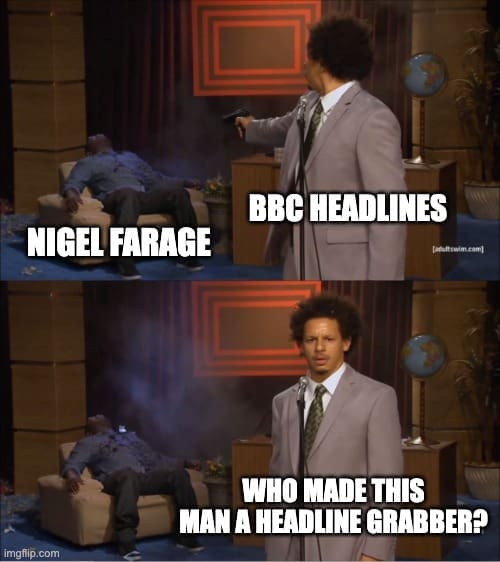

You could argue the situation with Farage is a chicken and egg one: does the BBC constantly invite Farage on to their shows because he’s widely popular, or is he widely popular because the BBC constantly invites him on to their shows?
A counter-argument is that Farage wasn’t all that popular in the first place. Take the 2019 election for instance, when the Farage-washing was in full swing:
This is getting beyond ridiculous. Another day, another Farage guest slot on a prime BBC politics show.
They built him up before the EU referendum and the BBC are doing it again. Blatantly and rubbing our noses in it again. I’m amazed that some people still defend them. pic.twitter.com/1GEchaXZFF— Devutopia (@D_Raval) May 11, 2019
The result of the 2019 election? Farage’s Brexit Party (now Reform) performed worse than the Green Party, and yet Farage enjoyed significantly more attention than they did:
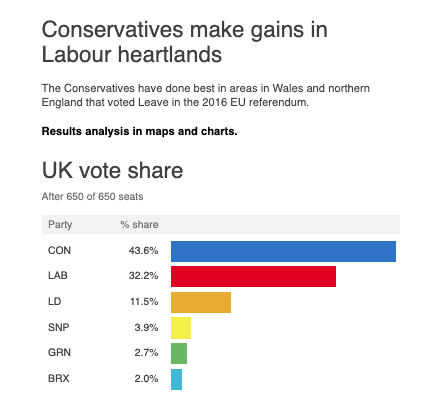

You could argue this was because 2019 was the ‘Brexit election’, and the Brexit Party only underperformed because they made a pact with the Tories. To counter-argue again, was it the ‘Brexit election’ because that’s all anybody cared about, or was it the Brexit election because the media insisted it was?
In the current election, this is what YouGov polling looks like now:
🚨 Labour lead by 18pts (majority of 266)
🔴 LAB 37% (-1)
🟣 REF 19% (+2)
🔵 CON 18% (-)
🟠 LD 14% (-1)
🟢 GRN 7% (-1)
🟡 SNP 3% (+1)Via @YouGov, 12-13 June (+/- vs 10-11 June) pic.twitter.com/5Mt5Jrc4yk
— Stats for Lefties 🍉🏳️⚧️ (@LeftieStats) June 13, 2024
This is what it looked like a week after the election was called:
🚨 POLL: Labour lead by 27% (majority of 422)
🔴 LAB 47% (+3)
🔵 CON 20% (-2)
🟣 REF 12% (-2)
🟠 LD 9% (=)
🟢 GRN 7% (+1)
🟡 SNP 3% (=)Via @YouGov, 27-28 May (+/- vs 23-24 May) pic.twitter.com/IWaJeT5MOh
— Stats for Lefties 🍉🏳️⚧️ (@LeftieStats) May 29, 2024
What’s clear is that the more people have seen of Labour and the Tories, the more they’ve turned to alternatives to the establishment. We can’t conclusively say one way or the other, but where would the Greens be now if they and their policies had enjoyed as much air time as Farage? Given that the below are the policies in question, we’d say they’d have done better than just holding steady:
🤯 The Labour manifesto represents a diagnosis of doom for our NHS, promising a BELOW INFLATION investment.
💚 Only the Green Party is offering the genuine investment that our NHS and social care are crying out for, funded by a tax on the super-rich and fairer capital gains tax. pic.twitter.com/VKu3RMe8se
— The Green Party (@TheGreenParty) June 14, 2024
What’s wrong with these people?
Kuenssberg’s blog is notable for another thing – namely that it features some of the oddest quotes committed to print. This is how it opens:
“Farage no more wants responsibility than he wants a vegan cigarette,” a long-serving, maybe long-suffering, Brexit campaigner tells me.
Is there such a thing as a non-vegan cigarette? Is Farage rolling his fags in salami?
This seems to be a classic example of a goon thinking everything they don’t like is ‘woke’, or ‘vegan’, or ‘science’ – having no idea what these terms actually mean.
The next quote is even more unseemly (emphasis added):
For the Conservatives, dealing with the right is not a new dilemma and the arguments over how to handle it are familiar.
Do you face the political danger and appeal to the right, leaving Reform as little space as possible? Or stick the flag squarely in the middle and not give their arguments any oxygen?
Invite Nigel Farage and his fellow travellers in, occupy that political territory, be “real” Conservatives, one side reckons.
Tory peer Lord Marland said as much on Friday. “I saw him [Farage] at a few Conservative events and he was kind of lifting his trouser leg towards us, and they didn’t take the opportunity of binding him into the side.”
We don’t imagine Farage was actually walking around with his trousers at half mast; we do believe his snivelling must have been truly unsightly to warrant such an unpalatable description.
Ever rightwards
There is some genuine insight in Kuenssberg’s blog – particularly in the following quote:
Some ministers believe Rishi Sunak has played into Mr Farage’s hands. “Don’t draw attention to things you can’t fix” like illegal migration, one cabinet minister told me.
Others think vowing to “stop the boats” without more radical action, like leaving the European Convention on Human Rights, has made the problem much worse – hot rhetoric, tepid policy.
The unnamed source names Sunak, but you could just as easily say the same of the BBC. Because this is what’s been going on these past few years:
- Farage says the Tories and Labour aren’t right-wing enough.
- The media reports this.
- The Tories and Labour goose step to the right.
A similar thing has been happening in France, and just look how that’s working out for the right-leaning centrist Emmanuel Macron who just called an election of his own:
France, Ifop poll:
RN-ID: 35%
FP-LEFT|G/EFA|S&D: 26% (+1)
Ensemble-RE: 19% (+1)
LR-EPP: 7% (-2)
Divers gauche-*: 3.5% (-1.5)
REC-ECR: 3% (-1)
Divers droite-*: 1.5%+/- vs. 10-11 June 2024
Fieldwork: 13-14 June 2024
Sample size: 1,089
➤ https://t.co/oL97q6lO3I pic.twitter.com/Ry73snGpnr— Europe Elects (@EuropeElects) June 16, 2024
Macron’s Ensemble is on 19%; the newly formed left-wing alliance is at 26%, and Marine le Pen’s National Rally (formally the National Front) is at 35%.
The National fucking Front.
This is very possibly what’s going to happen in the UK if the Tories and Labour keep blaming all our problems on migration while simultaneously doing nothing to ‘solve’ the issue:
🚨 BREAKING: Labour’s manifesto pledges “strong borders”, and says the “small boats crisis” is “undermining our security”.
The party promises to “fast-track” and “speed up” deportations, calling for “secure borders”. pic.twitter.com/f9nAr6XZas
— Stats for Lefties 🍉🏳️⚧️ (@LeftieStats) June 13, 2024
Farage-land
Describing the movement of asylum seekers as ‘illegal’ is strongly contested and widely condemned. However you refer to these people, though, it’s a safe assumption that their numbers will only increase as climate change and forever wars ravish the globe.
This gives us two possible solutions: we find a way of welcoming these people into the UK, or we violently halt their movement. Politicians and journalists who think there’s a middle ground – that we can demonise migrants without convincing voters these people need to be exorcised completely – are living in a fantasy.
So we return to that question: how does Farage grab so many headlines?
The answer is that if he didn’t, the BBC would have to give space to those say we should tax the rich; to those who believe that migrants are people, and to those who know the UK’s problems aren’t somehow the fault of its least powerful citizens.
Featured image via BBC


